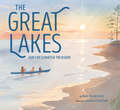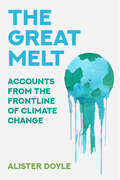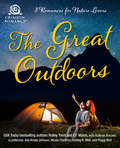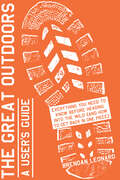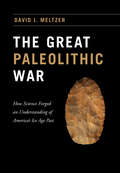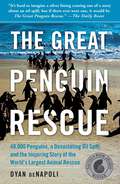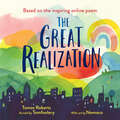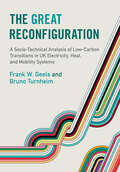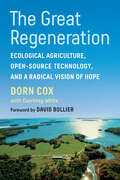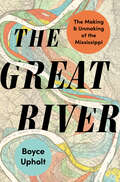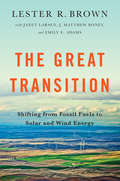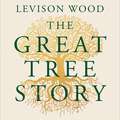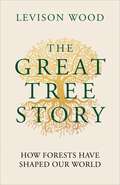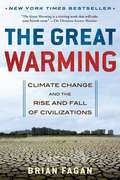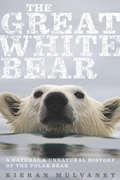- Table View
- List View
The Great Lakes Water Wars
by Peter AnninFor over a century the Great Lakes have been the target of controversial diversion schemes to sell, send, or ship water to thirsty communities, sometimes far from the source. In 2008, eight US states signed the historic Great Lakes Compact designed to protect the region's precious freshwater resources. Now water diversion controversies of a different kind are pitting communities and states against one another. Will the water wars ever be settled?With three new chapters and significant revisions that bring the story up to date over the past decade, this is the definitive behind-the-scenes account of the people and stories behind hard-fought battles to protect this precious resource that makes the region so special for the millions who call it home.
The Great Lakes: Our Freshwater Treasure
by Barb RosenstockA stunning picture book about the five largest lakes in North America - how they formed, the importance of their abundant freshwater, and how they've become a national treasure - in the latest book from the author of Caldecott Honor book The Noisy Paint Box.The Great Lakes—Huron, Ontario, Michigan, Erie, and Superior—are five blue jewels set a bit off center in a belt across North America&’s middle. Bordered by eight states and part of Canada, the Lakes hold 21% of the world's fresh water. How did these incredible lakes get there? And what can we do to preserve such a treasure?Follow along as a drop of water in this enormous system and uncover its dramatic journey from lake to rive to lake, over Niagara Falls to lake and river again, and finally into the Atlantic Ocean.
The Great Ledge
by Peter DavisonJames Dickey, in reviewing Peter Davison's last book, Praying Wrong: New and Selected Poems, 1957-1984, said, ' Davison will not let things break him. His voice is his; he has earned it and can use it, and as a result is surely one of our better poets.' That sense of this poet's singularity is one of the great strengths of this new book; these deeply felt poems are uniquely his. From the almost unbearably moving 'Equinox 1980, ' which opens the book, to the delightful 'Peaches, ' The Great Ledge confirms the remark of Vernon Young that Davison is 'one of the few poets of the first order writing in English today.'
The Great Lemonade Standoff
by Jeffrey Fuerst Laurence Knighton Ruth RomerPerform this script about two enterprising kids who open lemonade stands across the street from each other.
The Great Melt: Accounts from the Frontline of Climate Change
by Alister DoyleThe time for action is now.The fate of the world’s coasts rests on a knife edge as global warming melts ice sheets and glaciers from the Alps to the Andes. The choices we make now will determine whether oceans rise by a coast-swamping 1 metre by 2100 or whether we can save our coastal communities.From the glaciers of Antarctica and the high Andes, to the small island states of the Pacific and the coastal cities of Miami, New York, Venice and Rotterdam – Alister Doyle tracks the thaw that threatens life as we know it, shining a light on the most vulnerable people at the shoreline who are already moving inland, on the scientists puzzling about what is going on, and on the ideas about how to limit the damage.
The Great Northern Canada Bucket List: One-of-a-Kind Travel Experiences
by Robin EsrockFollowing a car accident in Vancouver, Robin Esrock set off on a worldwide expedition to tick off the many items on his personal bucket list. More than one hundred countries later, he realized that missing among his extraordinary adventures was his adopted home: Canada. Welcome to Robin’s acclaimed journey to discover the bucket-list-worthy experiences that define a nation. Travelling across Canada’s vast northern territories, Robin was delighted to find unique adventures for both visitors and locals alike. Through his discovery of nature, culture, history, food, and a few quirky tidbits of Canadiana, Robin's personal quest to tick off the exceptional destinations and activities of the North pack in enough adventure for a lifetime. Accompanied by recommendations, and with bonus content available online, discover one-of-a-kind experiences in Yukon, Northwest Territories, and Nunavut. Categorized by territory, The Great Northern Canada Bucket List will give you a first-hand perspective on: Camping in the High Arctic. Crossing the Northwest Passage. Watching wild beluga whales play at your feet. Tasting muktuk and Arctic char. Dogsledding with a Yukon Quest legend. Flying with Buffalo Air. Swallowing the Sourtoe Cocktail. ... and much more!
The Great Outdoors: 8 Romances for Nature Lovers
by Peggy Bird Nicole Flockton Kathryn Brocato Holley Trent Cj Petterson T. F. Walsh Ana Krista Johnson Shelley K WallA value-priced romance collection featuring popular weekend outdoor activities such as camping, hiking, and rafting for nature and fitness fans.Lace up your hiking boots and head out for adventure! Happy trails lead to happy endings for eight star-crossed couples in this digital collection of romances by bestselling and up-and-coming authors. The Cougar’s Pawn: Ellery Colvard agrees to a camping trip with her friends, hoping for a tiny thrill. Instead, she gets carried away—literally—by alpha were-cougar Mason Foye, who needs a mate to avoid his fate. But Ellery has some witchy ways, too, and she isn’t buying into his life story. The clock is ticking as Mason struggles to hold onto his son, his family, and this enchanting woman. Cloaked in Secrecy: Enre Ulf, a former member of the ruling wulfkin clan, plans to infiltrate Alena Novac’s circus clan and take out its alpha to save his home in Transylvania. Except he never expected his wolf claiming Alena as his mate or feeling compelled to save her brother, who was jailed for a murder he didn’t commit. With the police closing in and the blood feud threatening them, Alena and Enre must overcome their pasts to save their packs’ futures. The Look-Alike Bride: Leonie Daniel often stands in for her glamorous older sister, who works as a government agent. All Leonie has to do this time is spend a few weeks at Zara’s lakeside cabin, behave like Zara, and avoid Adam Silverthorne, the man her sister is interested in. But now Adam is falling for Leonie under false pretenses…or is he? Choosing Carter: When Bryn McKay’s brother escapes from prison bent on revenge, she invites her best friend, naturalist and outdoor guide Carter Danielson, on a weekend rafting trip to help her de-stress—and she wouldn’t mind if things turned romantic. But Carter is a recovering alcoholic who shies away from commitment. Then her brother shows up and they must flee for their lives. Will imminent danger prompt Carter to finally figure out where his heart lies? Jade’s Treasure: Booked at a mountain resort under an alias, world-famous author Matthew Riley McLaughlin expects to be left alone to write. Until he meets the charming Jade Sawyer—surely, a bit of pleasure with his business is exactly what he needs. But this plot doesn’t suit Jade’s idea of a good story, especially when she learns their attraction was built on a lie. Matt knows he messed up—but can he create a happier ending to their story? Tangled Vines: Kyle Davis arrives at his Australian ranch for some peace and quiet only to find caretaker Jordan Hastings in his shower. Jordan is trying to get her career as a winemaker back on track by bringing the property’s neglected grapes to life. Falling for a man who controls her employment is not in her plans. Yet the more time they spend together, the more open they become to taking another risk on living and loving. Find Me: Amanda Gillespie never bargained on seeing Jackson Holstenar after their complicated relationship ended with her being asked to leave the law firm where they worked. Now he’s in the weird position of trying to help her become his best pal’s ideal girl. With a little help from fate, these two confused hearts might just find a way back to each other for good. Falling Again: When Fiona McCarthy’s investigative piece and Nick St. Claire’s photography assignment intersect at a mysterious cabin at Mt. Hood National Forest, can their feelings for each other survive her need to get the story and his to frame the perfect shot? Sensuality Level: Sensual
The Great Outdoors: Everything You Need to Know Before Heading into the Wild (and How to Get Back in One Piece)
by Brendan Leonard“Leonard’s durable tome (seriously, the cover is rubber) is stuffed with so many tips about surviving in the wild, you’ll be able to leave your smartphone behind.” —Entertainment Weekly, Best New Books This easy introduction to outdoor life will ensure that even a novice won’t get lost in the woods while finding an activity he loves to do in the great outdoors--whether it’s hiking a 14er or camping on ice. With 400 strategies for engaging in the outdoors, and expert tips and tricks, The Great Outdoors: A User’s Guide makes Mother Nature easier to understand than ever before. Brendan Leonard, writer, filmmaker, and outdoor adventurer, shows the reader how rewarding it can be to live life away from the computer and get outside. From mountain climbing, to skiing, sledding, and sailing, Leonard shows that you don’t need to be a risk taker to enjoy the outdoors. And if the reader does find himself at the point of man vs. nature, Leonard shares survival skills from how to bandage a wound and read a topographical map, to how to drive on sand and remove a tick from your skin—all organized thematically and written in short takeaway entries with helpful line drawings. Bound in a uniquely rugged (and waterproof!) PVC cover material, The Great Outdoors: A User’s Guide is a friendly way into the outdoor lifestyle, whether you're looking to dabble or go all in.
The Great Paleolithic War: How Science Forged an Understanding of America's Ice Age Past
by David J. MeltzerFollowing the discovery in Europe in the late 1850s that humanity had roots predating known history and reaching deep into the Pleistocene era, scientists wondered whether North American prehistory might be just as ancient. And why not? The geological strata seemed exactly analogous between America and Europe, which would lead one to believe that North American humanity ought to be as old as the European variety. This idea set off an eager race for evidence of the people who might have occupied North America during the Ice Age--a long, and, as it turned out, bitter and controversial search. In The Great Paleolithic War, David J. Meltzer tells the story of a scientific quest that set off one of the longest-running feuds in the history of American anthropology, one so vicious at times that anthropologists were deliberately frightened away from investigating potential sites. Through his book, we come to understand how and why this controversy developed and stubbornly persisted for as long as it did; and how, in the process, it revolutionized American archaeology.
The Great Paper Caper
by Oliver JeffersFrom the illustrator of the #1 smash hit The Day the Crayons Quit comes a whodunnit just right for the youngest of readers (not to mention instructions for how to build the perfect paper airplane!)The animals? homes are disappearing. Tree by tree, the forest is being cut down. Clues! There must be clues. For instance, look--there is a mysterious bear carrying an ax! But what would a bear want with so many trees? Perhaps the discarded paper airplanes littering the forest floor have a story to tell?Oliver Jeffers' quirky, childlike humor and lovable illustrations are in full effect in this funny whodunit featuring a winning cast of animals and a message about the importance of conservation and recycling.
The Great Penguin Rescue: 40,000 Penguins, a Devastating Oil Spill, and the Inspiring Story of the World's Largest Animal Rescue
by Dyan deNapoliON JUNE 23, 2000, the iron-ore carrier MV Treasure, en route from Brazil to China, foundered off the coast of Cape Town, South Africa, spilling 1,300 tons of oil into the ocean and contaminating the habitat of 75,000 penguins. Realizing thJuneat 41 percent of the world’s population of African penguins could perish, local conservation officials immediately launched a massive rescue operation, and 12,500 volunteers from around the globe rushed to South Africa in hopes of saving the imperiled birds.Serving as a rehabilitation manager during the initial phase of the three-month rescue effort, Dyan deNapoli—better known as "the Penguin Lady" for her extensive work with penguins—and fellow volunteers de-oiled, nursed back to health, and released into the wild nearly all of the affected birds. Now, at the tenth anniversary of the disaster, deNapoli recounts this extraordinary true story of the world’s largest and most successful wildlife rescue. When she first entered the enormous warehouse housing most of the 19,000 oiled penguins, the birds’ total silence told deNapoli all she needed to know about the extent of their trauma. African penguins are very vocal by nature, prone to extended fits of raucous, competitive braying during territorial displays and pair-bonding rituals, but these poor creatures now stood silently, shoulder to shoulder, in a state of shock. DeNapoli vividly details the harrowing rescue process and the heartbreaking scenarios she came up against alongside thousands of volunteers: unforgettable images of them laboriously scrubbing the oil from every penguin feather and force-feeding each individually; the excruciatingly painful penguin bites every volunteer received; and the wrenching decisions about birds too ill to survive. She draws readers headfirst into the exhausting physical and emotional experience and brings to life the cast of remarkable characters—from Big Mike, a compassionate Jiu-Jitsu champion with a booming voice, who worked every day of the rescue effort; to a man named Welcome, aka "the Penguin Whisperer," who had the amazing ability to calm any penguin he held in his arms; to Louis, a seventeen-year-old medical student who created a new formula for the highly effective degreaser used by the rescue mission—whose historic and heroic efforts saved the birds from near extinction. The extraordinary international collaboration of scientists, zookeepers, animal rescue groups, and thousands of concerned individuals helped save the African penguins—recently declared an endangered species—from an all-too-common man-made disaster.DeNapoli’s heartwarming and riveting story is not just a portrait of these captivating birds, nor is it merely a cautionary tale about the environment. It is also an inspirational chronicle of how following one’s passion can lead to unexpected, rewarding adventures—and illustrates not only how people from around the world can unite for a greater purpose, but how they can be extraordinarily successful when doing so. The Great Penguin Rescue will inspire readers to believe they can make a difference
The Great Quest: A Romance Of 1826, Wherein Are Recorded The Experiences Of Josiah Woods Of Topham, And Of Those Others With Whom He Sailed For Cuba And The Gulf Of Guinea
by Charles Boardman HawesThe story opens in Massachusetts in 1826. After Neal Gleazen unexpectedly returns to town, he involves childhood friend Seth Woods and Seth&’s nephew, twenty-year-old Joe, in a dangerous sea journey to retrieve a hidden treasure. But everything is not as it seems and Joe and Seth must come to terms with the truth and make the right choices or all will be lost. A Newbury Medal Nominee
The Great Realization
by Tomos Roberts (Tomfoolery)Selected by Today as a book "to ease kids’ anxiety about coronavirus.”We all need hope. Humans have an extraordinary capacity to battle through adversity, but only if they have something to cling onto: a belief or hope that maybe, one day, things will be better.This idea sparked The Great Realization. Sharing the truths we may find hard to tell but also celebrating the things—from simple acts of kindness and finding joy in everyday activities, to the creativity within us all—that have brought us together during lockdown, it gives us hope in this time of global crisis.Written for his younger brother and sister in response to the Covid-19 pandemic, Tomos Roberts’s heartfelt poem is as timely as it is timeless. Its message of hope and resilience, of rebirth and renewal, has captured the hearts of children and adults all over the globe—and the glimpse it offers of a fairer, kinder, more sustainable world continues to inspire thousands every day. With Tomos Roberts’s heartfelt poem and beautiful illustrations by award-winning artist Nomoco, The Great Realization is a profound work, at once striking and reassuring, reminding readers young and old that in the face of adversity there are still dreams to be dreamt and kindnesses to be shared and hope. There is still hope.We now call it The Great Realizationand, yes, since then there have been many.But that’s the story of how it started . . .and why hindsight’s 2020.
The Great Realization Ukrainian (Ukrainian Edition)
by Tomos Roberts (Tomfoolery)Translated by Dasha Peipon, writer, editor and teacher, who’s originally from Ukraine, and Larysa Tsilyk, a Ukrainian poet, HarperCollins Children’s Books is happy to make available in ebook format this picture book in the Ukrainian language for no charge in the hopes that it will bring joy to displaced Ukrainian children and their families.Selected by Today as a book "to ease kids’ anxiety about coronavirus.”We all need hope. Humans have an extraordinary capacity to battle through adversity, but only if they have something to cling onto: a belief or hope that maybe, one day, things will be better.This idea sparked The Great Realization. Sharing the truths we may find hard to tell but also celebrating the things—from simple acts of kindness and finding joy in everyday activities, to the creativity within us all—that have brought us together during lockdown, it gives us hope in this time of global crisis.Written for his younger brother and sister in response to the Covid-19 pandemic, Tomos Roberts’s heartfelt poem is as timely as it is timeless. Its message of hope and resilience, of rebirth and renewal, has captured the hearts of children and adults all over the globe—and the glimpse it offers of a fairer, kinder, more sustainable world continues to inspire thousands every day. With Tomos Roberts’s heartfelt poem and beautiful illustrations by award-winning artist Nomoco, The Great Realization is a profound work, at once striking and reassuring, reminding readers young and old that in the face of adversity there are still dreams to be dreamt and kindnesses to be shared and hope. There is still hope.We now call it The Great Realizationand, yes, since then there have been many.But that’s the story of how it started . . .and why hindsight’s 2020.
The Great Reconfiguration: A Socio-Technical Analysis of Low-Carbon Transitions in UK Electricity, Heat, and Mobility Systems
by Bruno Turnheim Frank W. GeelsThis book is intended for researchers, policymakers, and practitioners interested in the dynamics and governance of low-carbon transitions. Drawing on the Multi-Level Perspective, it develops a whole system reconfiguration approach that explains how the incorporation of multiple innovations can cumulatively reconfigure existing systems. The book focuses on UK electricity, heat, and mobility systems, and it systematically analyses interactions between radical niche-innovations and existing (sub)systems across techno-economic, policy, and actor dimensions in the past three decades. Comparative analysis explains why the unfolding low-carbon transitions in these three systems vary in speed, scope, and depth. It evaluates to what degree these transitions qualify as Great Reconfigurations and assesses the future potential for, and barriers to, deeper low-carbon system transitions. Generalising across these systems, broader lessons are developed about the roles of incumbent firms, governance and politics, user engagement, wider public, and civil society organisations. This title is also available as Open Access on Cambridge Core.
The Great Regeneration: Ecological Agriculture, Open-Source Technology, and a Radical Vision of Hope
by Dorn CoxIn the age of climate change, food scarcity, and increasing industrialization, can a few visionary farmers find global solutions through technology and create networked, open-source regenerative agriculture at a truly transformative scale?In The Great Regeneration, farmer-technologist Dorn Cox and author-activist Courtney White explore unique, groundbreaking research aimed at reclaiming the space where science and agriculture meet as a shared human endeavor. By employing the same tools used to visualize and identify the global instability in our climate and our communities—such as satellite imagery—they identify ways to accelerate regenerative solutions beyond the individual farm.The Great Regeneration also explores the critical function that open-source tech can have in promoting healthy agroecological systems, through data-sharing and networking. If these systems are brought together, there is potential to revolutionize how we manage food production around the world, decentralizing and deindustrializing the structures and governance that have long dominated the agricultural landscape, and embrace the principles of regenerative agriculture with democratized, open-source technology, disseminating high-quality information, not just to farmers and ranchers, but to all of us as we take on the role of ecosystem stewards.In this important book, the authors present a simple choice: we can allow ourselves to be dominated by new technology, or we can harness its potential and use it to understand and improve our shared environment. The solutions we need now, they write, involve a broader public narrative about our relationship to science, to each other, and to our institutions. And we all need to understand that the choices made today will affect the generations to come. The Great Regeneration shows how, together, we can create positive and lasting change.
The Great Reset: Global Elites and the Permanent Lockdown
by Marc MoranoHere is the antidote to the left's sinister push to use a worldwide crisis to infuse our lives with the values of collasal statism and dystopian self-hatred, all accelerated by the duplicitous manipulation of the recent pandemic. From the nationally best-selling author of The Politically Incorrect Guide to Climate Change.Welcome to 2030. I own nothing, have no privacy, and life has never been better. This is the vision of the Great Reset, according to globalist leaders. While proponents of the Great Reset push slogans like &“Build Back Better,&” &“The Fourth Industrial Revolution,&” and &“A New Normal,&” the Reset is nothing short of a rebranded Soviet system, threatening to strip away property rights, restrict freedom of movement and association, and radically reshape our diets and way of life. In The Great Reset: Global Elites and the Permanent Lockdown, bestselling author and ClimateDepot.com publisher, Marc Morano, unveils the origins of the Great Reset, who is behind it, how it is being implemented, and how COVID-19 and the alleged &“climate emergency&” accelerated its imposition on the United States. Packed with telling statistics and damning quotes, The Great Reset is the essential handbook for the public, the media, and activists on how to critically analyze and expose the tyrannical policies silently strangling our liberties today.
The Great River: The Making and Unmaking of the Mississippi
by Boyce UpholtA sweeping history of the Mississippi River—and the centuries of human meddling that have transformed both it and America. The Mississippi River lies at the heart of America, an undeniable life force that is intertwined with the nation’s culture and history. Its watershed spans almost half the country, Mark Twain’s travels on the river inspired our first national literature, and jazz and blues were born in its floodplains and carried upstream. In this landmark work of natural history, Boyce Upholt tells the epic story of this wild and unruly river, and the centuries of efforts to control it. Over thousands of years, the Mississippi watershed was home to millions of Indigenous people who regarded “the great river” with awe and respect, adorning its banks with astonishing spiritual earthworks. The river was ever-changing, and Indigenous tribes embraced and even depended on its regular flooding. But the expanse of the watershed and the rich soils of its floodplain lured European settlers and American pioneers, who had a different vision: the river was a foe to conquer. Centuries of human attempts to own, contain, and rework the Mississippi River, from Thomas Jefferson’s expansionist land hunger through today’s era of environmental concern, have now transformed its landscape. Upholt reveals how an ambitious and sometimes contentious program of engineering—government-built levees, jetties, dikes, and dams—has not only damaged once-vibrant ecosystems but may not work much longer. Carrying readers along the river’s last remaining backchannels, he explores how scientists are now hoping to restore what has been lost. Rich and powerful, The Great River delivers a startling account of what happens when we try to fight against nature instead of acknowledging and embracing its power—a lesson that is all too relevant in our rapidly changing world.
The Great Transition
by Bruce CampbellIn the fourteenth century the Old World witnessed a series of profound and abrupt changes in the trajectory of long-established historical trends. Transcontinental networks of exchange fractured and an era of economic contraction and demographic decline dawned from which Latin Christendom would not begin to emerge until its voyages of discovery at the end of the fifteenth century. In a major new study of this 'Great Transition', Bruce Campbell assesses the contributions of commercial recession, war, climate change, and eruption of the Black Death to a far-reaching reversal of fortunes from which no part of Eurasia was spared. The book synthesises a wealth of new historical, palaeo-ecological and biological evidence, including estimates of national income, reconstructions of past climates, and genetic analysis of DNA extracted from the teeth of plague victims, to provide a fresh account of the creation, collapse and realignment of Western Europe's late medieval commercial economy.
The Great Transition: Shifting from Fossil Fuels to Solar and Wind Energy
by Lester R. Brown Emily Adams Janet Larsen J Matthew RoneyThe great energy transition from fossil fuels to renewable sources of energy is under way. As oil insecurity deepens, the extraction risks of fossil fuels rise, and concerns about climate instability cast a shadow over the future of coal, a new world energy economy is emerging. The old economy, fueled by oil, natural gas, and coal is being replaced with one powered by wind, solar, and geothermal energy. The Great Transition details the accelerating pace of this global energy revolution. As many countries become less enamored with coal and nuclear power, they are embracing an array of clean, renewable energies. Whereas solar energy projects were once small-scale, largely designed for residential use, energy investors are now building utility-scale solar projects. Strides are being made: some of the huge wind farm complexes under construction in China will each produce as much electricity as several nuclear power plants, and an electrified transport system supplemented by the use of bicycles could reshape the way we think about mobility.
The Great Tree Story: How Forests Have Shaped Our World
by Levison Wood'A thrilling journey of discovery' -- Tristan Gooley, author of How to Read a Tree'Levison Wood has done the impossible. To tell the story of trees in a single book is a Herculean task, but one that he has resoundingly achieved.' -- Merlin Hanbury-Tenison, author of Our Oaken Bones'A thrilling, moving, and convincing journey through the life of trees.' -- Will Storr, author of The Status Game'This powerful book brims with curiosity, original thought, and cutting-edge research, but amidst the wonder, you can also hear the haunting 'cry' of the natural world.' -- Sophy Roberts, The Lost Pianos of Siberia Levison Wood has spent a lifetime exploring wild places and witnessing environmental challenges and conservation efforts around the world. Now, he's delving into the incredible world of forests. In this global investigation, The Great Tree Story explores the profound influence forests have had on our planet and civilisation. Each chapter digs into a different aspect of this relationship, from the evolutionary history of trees and their cultural significance in ancient civilisations, to the impacts of agriculture, colonisation, and the industrial revolution on forest ecosystems. The book highlights the wisdom of indigenous communities in forest stewardship, examines the environmental movement's efforts to protect forests, and analyses the causes and consequences of deforestation and environmental degradation.Forests are integral components of the global ecosystem. They serve as complex habitats for flora and fauna, supporting a delicate web of interdependence that we have only scratched the surface of understanding. Every organism, from the towering trees to the smallest insects, plays a crucial role in maintaining the biodiversity that sustains our planet. The intricate relationships woven within forests are not to be underestimated, for they are the threads that hold our world together.In this compelling weaving of fascinating anecdotes and in-depth research, Wood contemplates the future of forests, emphasising the importance of collective action and individual responsibility in preserving these vital ecosystems.
The Great Tree Story: How Forests Have Shaped Our World
by Levison Wood'A thrilling journey of discovery' -- Tristan Gooley, author of How to Read a Tree'Levison Wood has done the impossible. To tell the story of trees in a single book is a Herculean task, but one that he has resoundingly achieved.' -- Merlin Hanbury-Tenison, author of Our Oaken Bones'A thrilling, moving, and convincing journey through the life of trees.' -- Will Storr, author of The Status Game'This powerful book brims with curiosity, original thought, and cutting-edge research, but amidst the wonder, you can also hear the haunting 'cry' of the natural world.' -- Sophy Roberts, The Lost Pianos of Siberia Levison Wood has spent a lifetime exploring wild places and witnessing environmental challenges and conservation efforts around the world. Now, he's delving into the incredible world of forests. In this global investigation, The Great Tree Story explores the profound influence forests have had on our planet and civilisation. Each chapter digs into a different aspect of this relationship, from the evolutionary history of trees and their cultural significance in ancient civilisations, to the impacts of agriculture, colonisation, and the industrial revolution on forest ecosystems. The book highlights the wisdom of indigenous communities in forest stewardship, examines the environmental movement's efforts to protect forests, and analyses the causes and consequences of deforestation and environmental degradation.Forests are integral components of the global ecosystem. They serve as complex habitats for flora and fauna, supporting a delicate web of interdependence that we have only scratched the surface of understanding. Every organism, from the towering trees to the smallest insects, plays a crucial role in maintaining the biodiversity that sustains our planet. The intricate relationships woven within forests are not to be underestimated, for they are the threads that hold our world together.In this compelling weaving of fascinating anecdotes and in-depth research, Wood contemplates the future of forests, emphasising the importance of collective action and individual responsibility in preserving these vital ecosystems.
The Great Warming: Climate Change and the Rise and Fall of Civilizations
by Brian M. FaganA breakout bestseller on how the earth's previous global warming phase reshaped human societies from the Arctic to the Sahara--a wide-ranging history with sobering lessons for our own time. From the tenth to the fifteenth century the earth experienced a rise in surface temperature that changed climate worldwide--a preview of today's global warming. In some areas, including western Europe, longer summers brought bountiful harvests and population growth that led to cultural flowering. In the Arctic, Inuit and Norse sailors made cultural connections across thousands of miles as they traded precious iron goods. Polynesian sailors, riding new wind patterns, were able to settle the remotest islands on earth. But in many parts of the world, the warm centuries brought drought and famine. Elaborate societies in western and central America collapsed, and the vast building complexes of Chaco Canyon and the Mayan Yucatán were left empty. The history of the Great Warming of a half millennium ago suggests that we may yet be underestimating the power of climate change to disrupt our lives today--and our vulnerability to drought, writes Fagan, is the "silent elephant in the room. "
The Great White Bear: A Natural and Unnatural History of the Polar Bear
by Kieran MulvaneyPolar bears are creatures of paradox: They are white bears whose skin is black; massive predators who can walk almost silently; Arctic residents whose major problem is not staying warm, but keeping cool. Fully grown they can measure 10 feet and weigh close to 2,000 pounds, but at birth they are just 20 ounces. Creatures that may wander thousands of miles over the course of a year, they begin life in a snowdrift. Human encounters with these legendary beasts are cause for both excitement and apprehension. Tales throughout history describe the ferocity of polar bear attacks on humans; but human hunting of polar bears has exacted a far larger toll, obliging Arctic nations to try to protect their region's iconic species before it's too late. Now, however, another threat to the polar bears' survival has emerged, one that is steadily removing sea ice and the life it supports. Without this habitat, polar bears cannot exist. The Great White Bear celebrates the story of this unique species. Through a blend of history, both natural and human, through myth and reality and observations both personal and scientific, Kieran Mulvaney masterfully provides a context for readers to consider the polar bear, its history, its life, and its uncertain fate.
The Great White Shark Scientist (Scientists in the Field Series)
by Sy Montgomery Keith Ellenbogen<P>Dr. Greg Skomal, biologist and head of the Massachusetts Shark Research Program, is investigating a controversial possibility: Might Cape Cod's waters serve as a breeding ground for the great white shark, the largest and most feared predatory fish on Earth? <P>Sy Montgomery and Keith Ellenbogen report on this thrilling turning point in marine research and travel to Guadeloupe, Mexico, to get up close and personal with the sharks. This daring expedition into the realm of great whites shows readers that in order to save the planet and its creatures, we must embrace our humanity and face our greatest fears. <P><b>Winner of the 2018 Riverby Award</b>

